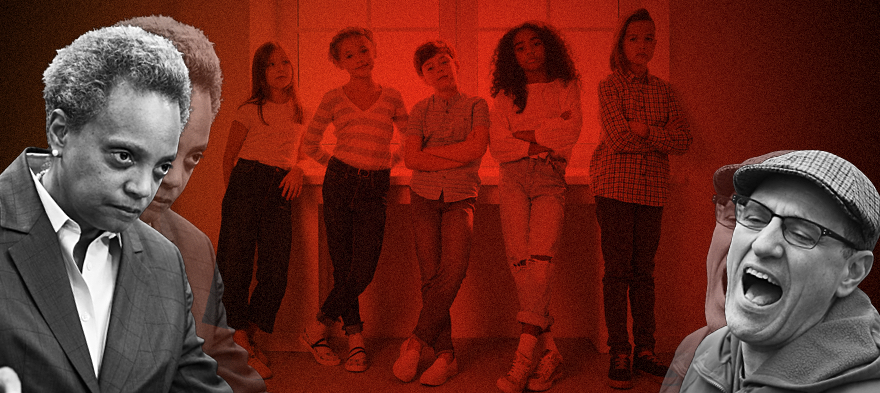The politics of education are broken and we are seeing the effects of it play out in real-time.
In Chicago, a stalemate over remote learning options and reopening of schools amidst the Omicron variant’s spread resulted in multi-day refusal to work by teachers. Mayor Lori Lightfoot held firm to her position that there should be no virtual option. Everyone dug in their heels and harsh invective flew.
“This mayor is unfit to lead our city,” said Chicago Teachers Union Vice President Stacy Davis Gates. “She’s on a one-woman kamikaze mission to destroy our public schools.”
For her part, Mayor Lightfoot told a national audience on NBC’s Meet the Press that teachers needed to “get real” about getting back to in-person learning.
“To be clear, what the Chicago Teachers Union did was an illegal walk-out,” Lightfoot said. “They abandoned their posts and they abandoned kids and their families.” She also doubled down with additional rhetoric, “We will not relent.”
Oh, wow. Insert palm-to-face emoji here.
The fraught dynamic just further erodes trust in our public schools specifically and public institutions generally.
Well, after nearly a week, an agreement around random COVID-19 testing was reached. Teachers returned to the classroom and school resumed. The Mayor and the CTU returned to their respective corners where they will presumably continue to snipe at one another and generally maintain a level of rancor that produces little for students and families in terms of improved schools or modeling what collaboration should look like. Mostly, like the politics of education across the country, the fraught dynamic just further erodes trust in our public schools specifically and public institutions generally.
But hey, keep up the “good” fight, yall!
I want to be clear, I’m not saying one side or the other is right or wrong on the substance of the issue. Districts like Chicago are taking huge steps to keep kids safe during an unprecedented pandemic. At the same time, this is a novel virus, and many teachers and, indeed, families do not feel comfortable with in-person instruction for a multitude of reasons.
Rather than trying to figure out which side is superior either ethically or scientifically, what if we had approached this situation with the perspective that both sides are right?
- What if Mayor Lightfoot could have offered a remote learning option for students without fear that the CTU would exploit it to close down all in-person learning?
- What if the CTU had the historical experience that allowed them to believe the pledges of CPS leadership that schools were safe?
In all of this back and forth, sniping and general intransigence on the part of adults there are no winners and one big loser—kids.
The administration-union relationship in Chicago is just a symptom of a broader problem. Schools are increasingly the centralized place for every battle: social, political, moral, you name it! In all of this back and forth, sniping and general intransigence on the part of adults there are no winners and one big loser—kids.
It’s clear that families, schools and communities are not monoliths. Some are clamoring for an exclusive commitment to in-person instruction, boasting high vaccination rates and a shared perspective on the low risks of transmission for healthy communities.
Many other communities, Black and brown communities among them, are more fearful of what the virus might mean for medically fragile friends and family and have lifetimes of experience validating their mistrust in government institutions and the scientific-medical establishment. Nuance and understanding are what we need, but instead, we get absolutism and bluster. Groups pick a side and nobody sees or hears the other side in a way that resembles anything humane or generous.
It’s especially galling to see this from educators and leaders who claim to believe in a vision of public education that produces a common good that is so vital to democracy and social cohesion. As soon as the problems are inside the schoolhouse, these ideals are simply tossed aside and the knives come out.
What happened to modeling for students?
What happened to walking the walk and not just talking the talk?
We talk all day about academic pedagogy, we should pay as much attention to the public pedagogy of how we do education politics.
The lack of trust, the absence of good faith, that floods our education politics make it more and more likely that we will see the big challenges facing our kids—opportunity gaps, structural racism, and more—grow bigger and solutions to them slide further and further out of reach.
The lack of trust, the absence of good faith, that floods our education politics make it more and more likely that we will see the big challenges facing our kids—opportunity gaps, structural racism, and more—grow bigger and solutions to them slide further and further out of reach. That’s why we need to look to and elevate the leaders and communities that are actually building positively toward the empowerment of their students and schools. If our children see only dysfunction, we’ll only see more of it when it’s their turn running the show—unless the goal is to show students what not to do when they hold these positions.
Sharif El-Mekki
Latest posts by Sharif El-Mekki (see all)
- Chicago Isn’t the Only City Putting Politics Over Kids - January 14, 2022
